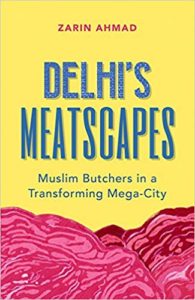“Delhi’s Meatscapes: Muslim Butchers in a Transforming Mega-City” by Zarin Ahmad
 Zarin Ahmad’s Delhi’s Meatscapes: Muslim Butchers in a Transforming Mega-City is a history of predominantly Muslim butchers particularly the Qureshi community (biradri) but others in the meat sector are discussed as well. A fascinating history of how the butchers ( for halal and jhatka meat) have operated in Delhi for generations with the Idgah abattoir being established in the early twentieth century by the British when they moved the capital from Calcutta to Delhi. The next major shift was with Partition and the divisions created within the abattoir for butchering halal and jhatka meat keeping religious sentiments of the Muslims and Hindus in mind, respectively. At the same time it is a disturbing account of how there have been massive shifts in the business in recent years. These changes are mostly due to political and economic pressures such as shifting the abattoir to the outskirts of the National Capital Region where slowly even the state support is being taken away and only the private firm managing it allowed to operate. It has affected the business of local butchers. Also the rising intolerance towards Muslims and those who eat meat has also resulted in changing cityscapes.
Zarin Ahmad’s Delhi’s Meatscapes: Muslim Butchers in a Transforming Mega-City is a history of predominantly Muslim butchers particularly the Qureshi community (biradri) but others in the meat sector are discussed as well. A fascinating history of how the butchers ( for halal and jhatka meat) have operated in Delhi for generations with the Idgah abattoir being established in the early twentieth century by the British when they moved the capital from Calcutta to Delhi. The next major shift was with Partition and the divisions created within the abattoir for butchering halal and jhatka meat keeping religious sentiments of the Muslims and Hindus in mind, respectively. At the same time it is a disturbing account of how there have been massive shifts in the business in recent years. These changes are mostly due to political and economic pressures such as shifting the abattoir to the outskirts of the National Capital Region where slowly even the state support is being taken away and only the private firm managing it allowed to operate. It has affected the business of local butchers. Also the rising intolerance towards Muslims and those who eat meat has also resulted in changing cityscapes.
Zarin Ahmad despite being a Muslim herself did not find it easy to be accepted in what is essentially a male-dominated industry. Women are never to be seen in or near abattoirs though some may sell meat in their shops. This gender dimension adds an equally interesting layer to the book for how Zarin Ahmad negotiates these spaces while gathering information. While it took the butchers a while to get used to the presence of a woman in the abattoir they were equally suspicious of her being a journalist. But small courtesies like wearing full-sleeved salwar-kameez with a dupatta and covering her head when the call for prayers ( azan) was heard helped get her accepted. Interestingly being a woman even though she was not a Qureshi allowed her to enter the women’s quarters in their homes and was readily accepted. She was able to have free flowing informal conversations that would inevitably venture into personal spaces but she also realised that it was not a one-way street. Field work research that involved asking questions of individuals meant that she too had to be prepared to answer a few in return from equally inquisitive people she met.
This is a multi-layered book that must be read by everyone for its witnessing by Zarin Ahmed of a tumultuous change in the meat sector of Delhi and its impact on the communities that are dependent upon it for survival. You do not need to be a academic to appreciate it.
Buy on Amazon
27 July 2018
